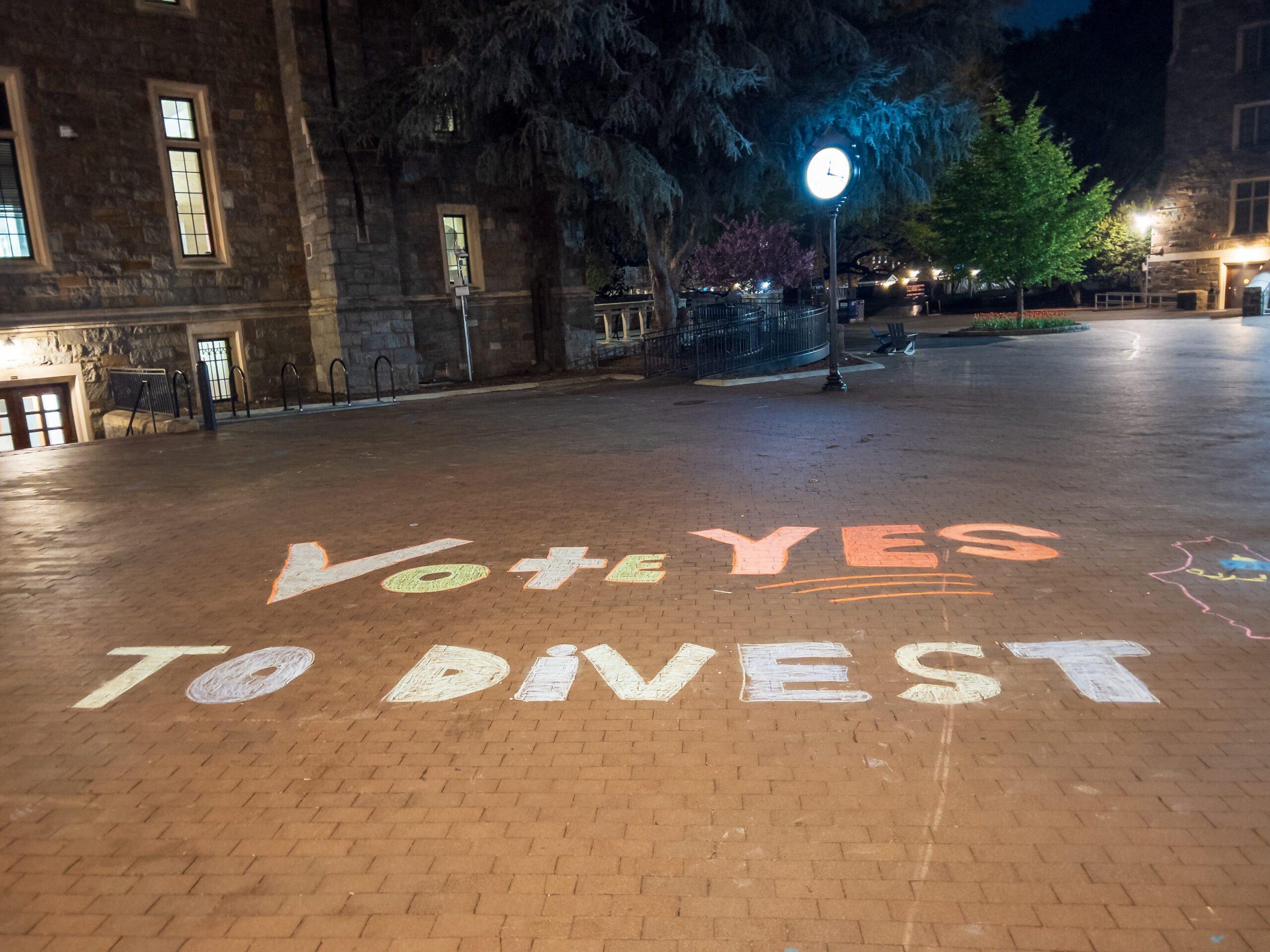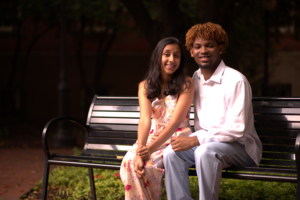Later this week, students will vote on whether or not Georgetown should divest from companies connected to the Israeli military. The Voice spoke to GUSA senators behind the referendum and students who both support and oppose the initiative.
The referendum calls for Georgetown to disclose its investments in companies arming Israel and to divest from said companies—including Amazon and Alphabet, which develop cloud computing technology for the Israeli military through Project Nimbus. Georgetown holds more than $55 million in investments in Amazon and Alphabet.
The referendum also calls for Georgetown to end university partnerships with Israeli institutions such as Tel Aviv University, citing the institutions’ “direct involvement in the occupation and genocide.” The legislation is, however, relatively unspecific in what this provision could mean in practice.
There is currently no university-sponsored opportunity for undergraduates to study abroad at Tel Aviv University or anywhere in Israel, but individual researchers between the two universities do collaborate on scholarship. Georgetown also appoints Israeli faculty, and the government department has a visiting professorship entitled the “Goldman Visiting Israeli Professorship” which hosts professors from a variety of Israeli universities, including at times Tel Aviv University.
As with all GUSA referendums, the divestment legislation will only pass if at least 25% of the student body participates in voting, and it gains a majority of those votes. Due to concerns about the vote occurring over Passover, a major Jewish holiday, GUSA moved voting on the referendum from April 14–16 to April 26–28.
While student referendums provide a snapshot of student’s views on an issue, the university is not compelled to act regardless of the outcome of a referendum.
“Student referendums do not create university policy and are not binding on the university,” a spokesperson for Georgetown wrote to the Voice.
This referendum comes nearly a year after thousands of university students across the country were arrested for participating in largely peaceful protests which condemned the connection between their institutions and Israeli attacks on the Gaza Strip. At Georgetown, some students participated in a joint-encampment with local universities at George Washington (GW) University, where seven Georgetown students were arrested.
Student protests emerged as Israel attacked and invaded Gaza following the Oct. 7. 2023 attacks by Hamas. On Oct. 7, Hamas killed nearly 1,200 people and abducted nearly 250 more, with 59 hostages remaining to this day.
In response, the Israel Defense Forces (IDF) destroyed large parts of Gaza, killing over 61,000 people and displacing 90% of its population. In November 2024, a UN Special Committee stated that the IDF’s tactics have been “consistent with characteristics of genocide,” specifying the interference with and destruction of food, water, and aid.
The attacks and heightened violence in the last year and a half are a continuation of a conflict that has been ongoing since before 1947, when the UN passed the Partition Plan that led to the establishment of the state of Israel.
The process behind the referendum in GUSA
The referendum, introduced on April 6, has received student pushback due to the atypical process the bill has gone through.
GUSA Vice Speaker Meriam Ahmed (SFS ’26) and Senator Sienna Lipton (CAS ’27) introduced the referendum after conversations with students outside GUSA. GUSA President Ethan Henshaw (CAS ’26) co-sponsored the bill.
“It was a group of interested students that came to us wanting to introduce [the bill], actually. I would say it wasn’t recent,” Ahmed said. “They shared with us their draft, we looked it over, and the draft was submitted to the Senate for a vote with the understanding that it had come from a group of students.”
The referendum did not go through the rulebook process of being brought before the Policy and Advocacy Committee and approved prior to its introduction to the Senate. In this case, these rules were suspended, taking the bill directly to the Senate. This is not uncommon; a similar divergence from the process occurred with the 2024 gender-inclusive housing referendum, according to GUSA Ethics and Oversight Chair Evan Cornell (CAS ’27).
“It is important to note that although the rules may be suspended, voting procedure was followed in the case of the most recent referendum along with every piece of legislation previously,” Cornell wrote to the Voice. “So while some may disagree with the use of suspending the rules, the body as a whole has utilized the same motion in order to push through a piece of last-minute legislative business many times.”
Some senators were surprised by the introduction of the referendum, which occurred within the last minutes of GUSA’s April 6 meeting.
“The sponsors of the resolution were very secretive about who was told about the referendum, who was responsible for putting it together, and its eventual introduction. The first time that I was notified about this referendum was 10 minutes before it was introduced,” GUSA Senator John DiPierri (SFS ’25) said. “There was no notification. There was no collaborative process with the entire Senate on putting the referendum together.”
Those who introduced the referendum emphasized concerns regarding student safety, leading to the decision to introduce the bill directly to the Senate and vote without public attribution. In recent weeks, the federal government has attempted to deport a number of international students because of their involvement in pro-Palestine activism. In the Georgetown community, the Department of Homeland Security arrested and detained Dr. Badar Khan Suri, a postdoctoral fellow, and there is an ongoing legal battle to prevent his deportation, which was blocked by a judge on March 20.
“The referendum was introduced, to my understanding, in line with standard procedures, and the only difference that happened was the lack of public attribution of the votes,” Ahmed said. “[This is] because of concerns for student safety that GUSA leadership, myself included, thought to be significant.”
The referendum received GUSA approval with 16 votes in favor and eight against, with four abstaining.
Student perspectives: Support and pushback
Student responses to the referendum have been varied. Student groups such as Students for Justice in Palestine (SJP) have been campaigning for the referendum, while groups such as the Jewish Student Association (JSA) and the Georgetown Israel Alliance (GIA) have been campaigning against it. Students from these groups have been blanketing the campus with flyers and tabling in Red Square nearly every day.
Lela Toljian (SFS ’26), an organizer of the D.C. Gaza Solidarity encampment at GW last spring, believes Georgetown must ensure its endowment is invested in accordance with its Jesuit values.
“All students have a responsibility to increase pressure on our university until we divest from Amazon, Alphabet, Microsoft, and all other entities with ties to the Israeli Occupation Forces,” Toljian wrote to the Voice. “We demand our university abide by their own Jesuit values and socially responsible investment policy — not one more cent for Genocide.”
S., a Palestinian student and a member of SJP who asked to be identified only by her first initial, is in favor of the referendum and emphasized Georgetown’s values in relation to her own identity.
“I want Georgetown, the school that I attend and that represents me as a student, to divest from corporations that are funding the mass murder of women and children and just innocent people in Gaza,” S. said.
The Voice is granting S. anonymity because of her safety concerns about being publicly identified. She said that being publicly identified as involved with activism could jeopardize her ability to visit her family in the West Bank—she’s worried that she could be detained at a checkpoint or denied entry at an airport for publicly voicing her anti-occupation stance.
S. said that the referendum is an issue of moral concern.
“We should not be tied to corporations that are profiting off of the death and the exploitation of other human beings. I think that in and of itself is a principle that we should all stand by as students at Georgetown,” she said.
The referendum specifically advocates divestment and separation from Israel—a provision that some students, including many Jewish students, feel is “discriminatory and antisemitic,” according to Maddie Stoller (CAS ’27), who is currently a co-president of the JSA.
Stoller cited the International Holocaust Remembrance Alliance’s (IHRA) definition of antisemitism to support her claim. The IHRA defines “applying double standards by requiring of Israel a behavior not expected or demanded of any other democratic nation” as antisemitism.
This definition of antisemitism is controversial, with critics arguing that it conflates legitimate criticism of Israel with antisemitism. But in Stoller’s view, the divestment referendum singles out Israel even while the university continues to have incredibly close ties with other countries that have documented histories of human rights violations, like Qatar, where Georgetown has a satellite campus.
“Insinuating that we should only divest from Israel for its human rights violations and not looking at any other country that Georgetown has relations with that also have human rights violations,” Stoller said. “It just feels very targeted towards the state of Israel and towards a lot of Jewish students on campus.”
However, Zach Samuel (SFS ’26) who’s also co-president of JSA, believes that even if the referendum were to pass, the university would likely not abide by its demands due to a commitment to “religious understanding.”
“I think that this referendum is destructive and threatening to the Jewish community. I’m not greatly concerned that the university administration will take significant action on it. With that being said, we also want to make sure that the administration, just as other students, know the viewpoint of Jewish students on this issue,” Samuel said.
Students in favor of the referendum believe it is not an attack on Jewish students, but an ask that the university separate itself financially from Israel’s attacks on Gaza.
“I think that by no means is this referendum an attack on Jewish students. I think that this referendum is merely a way, just one very small step, in advocating for a population that is being decimated,” S. said. “I just implore people to have empathy for the fact that thousands of people are being killed.”
The referendum includes a provision that calls for an end to university partnerships with Israeli institutions, including Tel Aviv University. Jackson Schnabel (SFS ’27) believes that this provision is necessary because these institutions are directly connected to the development of military strategy in Gaza. Schnabel cited the Dahiya doctrine, an Israeli military strategy that targets civilians and civilian infrastructure with large amounts of force. In 2008, Tel Aviv University’s Institute for National Security Studies published an article in support of the Dahiya doctrine, though the article, written by IDF reserve Gabi Siboni, represents the view of Siboni alone, not an official opinion of the university.
“[The referendum] mentions by name Tel Aviv University, that is a result of the fact that these institutions are directly involved in the crimes being committed in Palestine, in the West Bank, in Gaza,” Schnabel said.
Some students who oppose the referendum believe this portion of the referendum violates academic freedom.
“I think the few main problems we found with it revolve around academic freedom,” Stoller said. “Which means no visiting professors, no study abroad programs and just no exchange of meaningful dialogue. Any knowledge that Israelis would have would not be able to reach the school, which feels like not the point of a university and not the point of gaining education about the world and about certain topics.”
Samuel also emphasized that ending partnerships with Israeli institutions could also mean that Georgetown students might miss out on a variety of Israeli perspectives, including those that are critical of the ongoing devastation in Gaza. He believes that by cutting off access from institutions like Tel Aviv University, interested students lose access to education regarding the region.
“Many American Jews and Jewish students at Georgetown are critical of the Netanyahu government and the way that this war has proceeded. They want to learn about what’s been going on, and they wanna learn about the history of peacemaking in the Middle East, the history of the Arab-Israeli conflict,” Samuel said. “By cutting off an entire society’s academics and scholars and faculty from teaching to Georgetown students, we’re really losing out on intellectual resources that would be helpful in helping us to solve these issues.”
For S., the question of cutting ties does not hinge on whether students might miss out on alternative perspectives, but rather, whether it’s moral to have normal academic relationships with Israel given its actions in Gaza and the West Bank. She compared the situation to that of South African apartheid, during which many also advocated for an academic boycott.
“I think that most people, if they were asked the question, would you study abroad in apartheid South Africa, when Black people were being treated as subhuman, I think most people would say no,” S. said. “I think that by actually doing that travel and by engaging in that kind of academic environment, you’re in a way just saying that you don’t really care about these people that are being oppressed in this country.”
Samuel said that in the current political climate, where the federal government has been cracking down on universities due to student activism, passing this kind of legislation could be dangerous.
“ I think it would be destructive for Georgetown University to get into a fight over this referendum. We’re in a difficult time with national politics. We have the executive branch taking a lot of action at other universities across the country,” Samuel said.
In January, President Trump issued an executive order to end perceived antisemitism on college campuses. President Trump has since threatened universities with cuts to federal funding and restrictions on the ability to enroll international students if these orders are not followed.
Students in favor of the referendum acknowledged that the concerns that the Trump administration may punish the university for divestment, but in their perspective, being intimidated into silence by the federal government is not worth the moral price. Schnabel said that these threats should not prevent the student body from supporting the referendum.
“I think my initial response is we cannot let this administration dictate what we do through their threats of retaliation,” Schnabel said. “That makes making any sort of progress impossible.”






